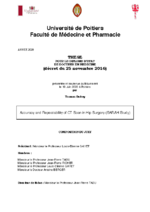Thèse d'exercice
Dutrey Thomas
Accuracy and Repeatability of CT Scan in Hip Surgery (SARAH Study)
FrançaisConsulter le texte intégral (format PDF)

Résumé
Français
Accuracy and Repeatability of CT Scan in Hip Surgery (SARAH Study)
Background: In cases of hip prothesis, acetabular cup wear remains a clinical challenge and current methods are associated with relative accuracy and weak reproducibility. In this study, we evaluated 3DSlicer open-source software providing image segmentation and CT-scan femoral head penetration (FHP) measurements. All 3DSlicer functions were executed in command line to avoid human interaction.
Methods: To simulate in-vitro FHP, polyethylene cups were modified to obtain given wear. Cups were then placed in a pelvic phantom and images acquired with a high and low dose protocol. Cup thicknesses measured by CT were compared to real values using Bland Altman method. Accuracy, repeatability, and bias of the CT method according to ISO definitions were calculated with the 95% confidence level. Kruskal-Wallis and pairwise Wilcoxon test were performed to compare the effects of the acquisition protocol, the reconstruction filter and the artefact corrector on accuracy. A p value under 0.05 was considered as significative or adjusted according to Bonferroni for multiple tests.
Results: The systematic error of the 3D fully automated method was -0.012 mm (CI 95% 0.013), the repeatability coefficient and the accuracy were 0.038 mm and 0.027 mm respectively. All measurement errors for all combinations of protocols, filters and corrector lied within the agreement limit under +/- 0.1 mm set as clinical acceptance threshold. The average time for analysis was 15 seconds (13,78 – 17,04). No difference on accuracy was found between routine low dose (3 – 3,4 mSv) and high-resolution (4,8 – 5,5 mSv) protocol (p = 0.36). TISSUE filter group was sensitive to artefacts with 4 outliers.
Conclusion: This approach is highly clinically applicable in routine use with a single CT method that requires only 15 seconds. The possibility of monitoring wear rate regardless of acquisition protocol and high accuracy level about 0.03 mm should be of interest in further in-vivo prospective studies.
Mots-clés libres : Hip arthroplasty, CT scan, Femoral head penetration, Polyethylene wear, Implant follow-up, 3DSlicer open-source software .
- Prothèses de hanche
- Chirurgie assistée par ordinateur
Notice
- Diplôme :
- Diplôme d'état de médecine
- Établissement de soutenance :
- Université de Poitiers
- UFR, institut ou école :
- UFR Médecine et Pharmacie
- Domaine de recherche :
- Médecine. Chirurgie orthopédique et traumatologie
- Directeur(s) du travail :
- Jean-Pierre Tasu
- Date de soutenance :
- 19 juin 2020
- Président du jury :
- Louis-Etienne Gayet
- Membres du jury :
- Louis-Etienne Gayet, Jean-Pierre Tasu, Jean-Pierre Richer, Antoine Berger
Menu :
-
-
à propos d'UPétille
-
Voir aussi
Annexe :

-
Une question ?
Avec le service Ubib.fr, posez votre question par chat à un bibliothécaire dans la fenêtre ci-dessous ou par messagerie électronique 7j/7 - 24h/24h, une réponse vous sera adressée sous 48h.
Accédez au formulaire...
Université de Poitiers - 15, rue de l'Hôtel Dieu - 86034 POITIERS Cedex - France - Tél : (33) (0)5 49 45 30 00 - Fax : (33) (0)5 49 45 30 50
petille@support.univ-poitiers.fr -
Crédits et mentions légales
